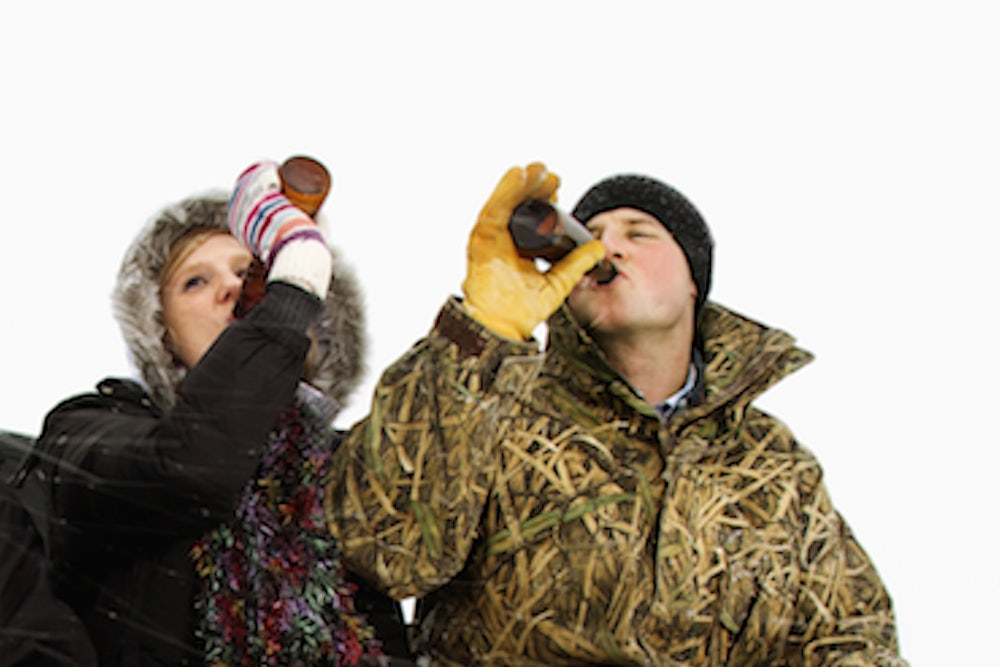It’s Friday, and it’s freezing outside, which can mean only thing: Many of you will be drinking tonight, both to celebrate the weekend and to "warm up." An Irish coffee, then, might seem the drink of choice—but not if you want to get the most bang for your buck, and to get your buzz on as quickly as possible. Here's the science behind getting smashed:
The best mixers are carbonated and sugarless
First, the basics: Fizzy drinks really do hit you faster. In a 2007 article in the Journal of Forensic and Legal Medicine, researchers at the Universities of Manchester and Lancashire had 21 people consume different types of drinks on separate occasions: straight vodka, vodka mixed with still water, or vodka mixed with carbonated water. When the researchers measured the subjects’ BACs, they found that all but one absorbed the undiluted vodka fastest, and most—14 out of 21—absorbed the vodka faster when it was mixed with carbonated water than when it was combined with still water.
Diet soda may ease the alcohol into your bloodstream even faster than regular soda. For a 2012 paper in the journal Alcoholism: Clinical & Experimental Research, cognitive psychologist Cecile Marczinski had eight men down an orange-flavored vodka drink containing sugar on one day, and a diet version on another. She found that the men achieved a breath alcohol content 18 percent higher when they drank the diet version. Diet mixers, she explained, “potentially empty more rapidly from the stomach and thereby increase the rate of alcohol absorption when compared with ‘regular’ versions containing sugar.”
Are hot drinks more effective?
Anahad O’Connor of the New York Times Well Blog claims, “Warm drinks are absorbed faster.” However, the most reliable source I found for this factoid—apart from the Times—was Ask.com. None of the researchers I contacted had heard of a correlation between the temperature of a drink and the rate of alcohol absorption. “It’s not my knowledge that hotter beverages are absorbed quicker,” said Dr. Harris Stratyner, who researches addiction at Mount Sinai Medical Center (and was quoted in O’Connor’s article). William Kerr, Senior Scientist at the Alcohol Research Group, also hadn’t heard of it; it didn’t strike Marczinski (author of the diet soda paper) as plausible, either.
Avoid stressful events—like watching eye surgery
Stressful events can kill your buzz. For a 1994 paper in the journal Health Psychology, a team of Canadian psychologists got 60 volunteers drunk off vodka cranberries, then assigned them to perform one of two tasks deemed stressful—holding their hand in ice water for ten minutes (with thirty-second breaks every minute) or watching a graphic 15-minute video of an eye surgery—or a neutral task, immersing their hand in a tub of room-temperature water. The ice water group reported the highest levels of distress, followed by the group that watched the surgery. These two groups reached their peak BAC faster:

But they also eliminated the alcohol from their blood faster:

They also reported feeling less intoxicated.
This is consistent with research from the 1970s—when ethics standards were less stringent—that suggested that getting an electric shock can also have a sobering effect. When subjects were given moderate electric shocks to their hands after getting drunk on whiskey, the shocks seemed to counteract the depressant effect of alcohol, and they performed better on reaction-time tests.
The takeaway: Don’t drink while straightening your hair in the bathroom.
Don’t eat beforehand
Most people figure this out on their own, but there’s data to back up the claim that drinking an on empty stomach is more efficient. In a 2011 study written up for the journal Science & Justice, University of Dundee scientists David Sadler and Joanna Fox gave 16 subjects drinks of vodka and orange juice under three conditions. On their first visit to the lab, the subjects had been fasting for six hours. The second time they came, they ate a bag of potato chips before drinking. The third time, they were given a chicken sandwich and a large portion of French fries. When the researchers compared the BACs they obtained after each episode, they found that eating a bag of chips didn’t make a huge difference—but after a meal, their BAC was only about 65 to 70 percent of what it was in the fasting condition. “Our results confirm that the presence of food in the stomach prior to drinking results in a much lower BAC than in the fasted and snack fed states,” conclude Sadler and Fox.
In an earlier study from 1994, researchers at Sweden’s Linkoping University Hospital monitored ten men as they drank in the morning, without eating anything, and on another day, after a breakfast of cheese sandwiches, eggs, coffee and yogurt. The men who ate breakfast achieved a blood alcohol content only 65 percent that of the group that imbibed on an empty stomach, and their buzz didn’t last as long: “The time required to metabolize the dose of ethanol was approximately two hours shorter after the subjects had eaten breakfast. These results suggest that food in the stomach before drinking not only leads to a lowering of the peak BAC and diminishes the feelings of intoxication, but also boosts the rate of ethanol metabolism.”
Don’t eat afterward, either
According to the Linkoping University researchers, as soon as you eat, the alcohol starts leaving the bloodstream faster. When the men were given a meal five hours after they finished drinking, “The mean rate of disappearance of alcohol from blood was increased by between 36 and 50 percent.”
So what's the fastest way to get wasted?
Use a carbonated, sugarless mixer.
Don’t eat.
Don’t watch videos of eye surgery.
Avoid electric shocks.
Image via shutterstock.
